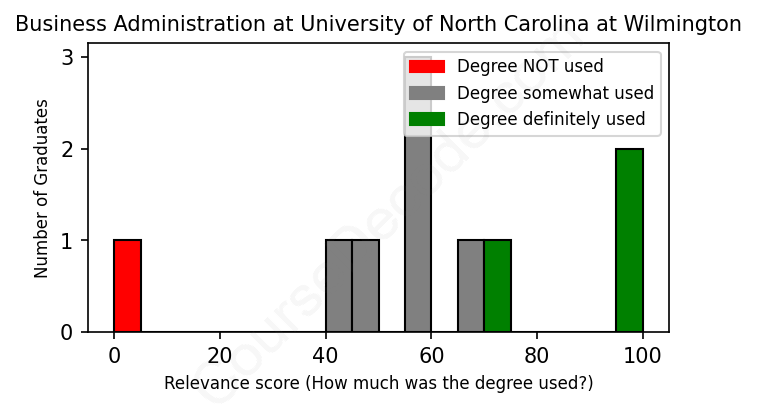
First, some facts. Of the Business Administration graduates from University of North Carolina at Wilmington we've analyzed , here's how many have used (or NOT used) their degree in their career:

These are estimates based on AI analysis of 10 LinkedIn profiles (see below).
The verdict? Below average. Overall, with an average relevance score of 59%, Business Administration graduates from University of North Carolina at Wilmington have a lower likelihood (-8%) of finding work in this field compared to the average graduate across all fields:
And for comparison, here's the chart for all profiles we've looked at across all degrees.
Also, after graduating, only 20% of these graduates have pursued further education other than another Bachelor's degree (such as a Masters degree or other), compared to the average across all profiles of 35%. This suggests a Bachelors degree is enough for most Business Administration graduates, and it's normal to look for work straight after graduation.
See the details:
|
Relevance score: 68% We think this person has gone into a career only somewhat relevant to their degree. We think this person has gone into a career only somewhat relevant to their degree.
DEGREE INFOGraduated in 2019 from University of North Carolina at Wilmington with a Bachelor of Business Administration - BBA in Business Administration. No other secondary education since. JOB HISTORY SINCE GRADUATIONLoan Officer Time Financing Service Jan 2020 - Dec 2020 Member Success Advocate  First American Jan 2021 - Dec 2021 Product Management Analyst  First American Jan 2022 - Dec 2023 Product Manager  First American Jan 2024 - Present ABOUTResults-driven Product Manager with experience in product development and a strong background in business development. Specializes in defining product vision, creating strategic roadmaps, and driving cross-functional collaboration to deliver impactful solutions. |
The top 10 most common jobs done by the graduates we've analyzed (ranked most common to least) are:
From the LinkedIn profiles of graduates from the University of North Carolina at Wilmington with a degree in Business Administration, it seems that many of them have found jobs in industries where they can utilize their business skills, particularly in roles like program management, operations, and sales. A significant number of these graduates are employed in managerial positions at companies like Duke Energy and Bank of America, where their responsibilities directly align with business administration principles such as strategic planning, supply chain management, and financial oversight. This trend suggests that a degree in Business Administration opens doors to various roles that require organizational and analytical skills, especially in sectors that prioritize operational efficiency and customer relations.
However, not all job roles listed are deeply connected to the core competencies gained through a Business Administration program. Some graduates ended up in positions like food service associates or content writers that do not fully leverage their business training. While these roles may involve some transferable skills, they don’t necessarily reflect the comprehensive knowledge of business operations that one would expect from a B.B.A. program. Overall, it does appear that most graduates are able to land relevant jobs, but there's a mix of both highly applicable roles and those that fall somewhat outside the traditional scope of business administration. This variety suggests that while a business degree is versatile, the connection to core business knowledge can vary quite a bit based on the specific job and industry.
Here is a visual representation of the most common words in job titles for Business Administration graduates (this is across all Business Administration graduates we've analyzed, not just those who went to University of North Carolina at Wilmington):

It looks like graduates from the University of North Carolina at Wilmington with a degree in Business Administration generally have pretty promising career trajectories. For their first jobs, many of them tend to take on positions related to management, sales, or customer service, which makes sense since these roles often require foundational business skills. For example, some started off in roles like Operations Specialist, Sales and Marketing Coordinator, or Customer Service Representative. These positions often serve as stepping stones that help them build valuable experience and skills that are applicable across various sectors.
Fast forward a few years—say five or ten—and you'll find that many grads are moving up the ladder into more specialized or managerial roles. We see cases like the Program Manager and Relationship Manager progressing in their careers, which indicates that they’re using their initial experiences to climb to higher positions. They generally seem to transition into roles that either reflect a continued focus on business management, like Economic Developer, or lean toward specialized fields, such as Product Management or Operations. Overall, while some graduates have explored other avenues, many have successfully carved out careers that align with their Business Administration degrees, suggesting a strong return on their educational investment.
Getting a Bachelor’s degree in Business Administration, including at the University of North Carolina at Wilmington, is generally considered to be more on the manageable side compared to some other majors. You’ll dive into topics like marketing, management, finance, and economics, but most of the courses focus on practical skills and group projects, which can be a bit easier to handle than heavy theoretical stuff. It can definitely get challenging when you hit advanced classes or need to juggle multiple group projects, but overall, it’s designed to be accessible for a lot of students. So, if you're organized and stay on top of your assignments, you should be able to navigate it without too much stress!
Most commonly, in the LinkedIn profiles we've looked at, it takes people 2 years to finish a Bachelor degree in Business Administration.
Based on the job histories of these Business Administration graduates from UNC Wilmington, it seems like they’re generally doing pretty well in terms of salary potential. For instance, the graduate who worked at Duke Energy steadily moved up to managerial roles, which suggests a solid paycheck, while the one with a mix of roles at companies like Google and in the legal field likely earned decent wages early on. The others, like the graduates who’ve taken on various sales and managerial jobs, also indicate good earning potential, especially since the banking, sales, and management sectors often come with attractive compensation packages and opportunities for growth. That said, some positions, like the associate role at Lane Bryant, might not pay as well, but overall, it looks like most of these graduates are on a good financial path!
Here is a visual representation of the most common words seen in the "about" section of LinkedIn profiles who have a Bachelor degree in Business Administration (this is across all Business Administration graduates we've analyzed, not just those who went to University of North Carolina at Wilmington). This may or may not be useful:

Here are all colleges offering a Bachelor degree in Business Administration (ordered by the average relevance score of their Business Administration graduates, best to worst) where we have analyzed at least 10 of their graduates: